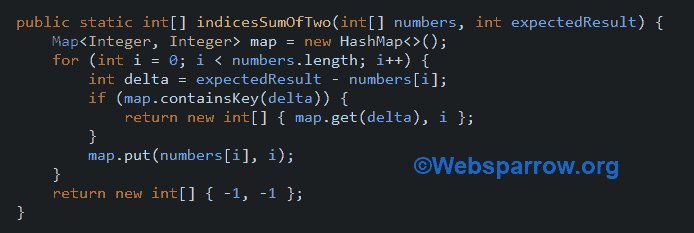Java- Find the index of the two numbers in the array whose sum is equal to a given number

Sometimes interviewer wants to check the candidate’s logical ability and the approach taken to solve the challenge/problem using Java.
Question: Return the indices of the two numbers such that they add up to a specific target of given an array of integers.
Example:
Given nums = [2, 5, 11, 8, 99, 4], target = 9,
Because nums[1] + nums[5] = 5 + 4 = 9,
return [1,5].The above problem can be solved in two ways:
1. Efficient Solution
By using some data structure we can do it more efficiently. Here create a HashMap and loop through the length of an array, calculate the delta of target & current number (delta = target - nums[i]), and check if the delta is available then return it.
public static int[] indicesSumOfTwo(int[] numbers, int expectedResult) {
Map<Integer, Integer> map = new HashMap<>();
for (int i = 0; i < numbers.length; i++) {
int delta = expectedResult - numbers[i];
if (map.containsKey(delta)) {
return new int[] { map.get(delta), i };
}
map.put(numbers[i], i);
}
return new int[] { -1, -1 };
}2. Brute Force Solution
A brute force/native solution is not recommended. In this, create an outer and inner loop and check if nums[i] + nums[j] == target, return the i & j.
public static int[] indicesSumOfTwoNativeSolution(int[] numbers, int expectedResult) {
for (int i = 0; i < numbers.length; i++) {
for (int j = 0; j < numbers.length; j++) {
if (numbers[i] + numbers[j] == expectedResult) {
return new int[] { i, j };
}
}
}
return new int[] { -1, -1 };
}Note: We have to handle the exception if indices of the two numbers is not equal to a specific target. In this example, we have returned the -1, -1.
See the complete example.
package org.websparrow.interview;
import java.util.HashMap;
import java.util.Map;
public class SumOfTwo {
public static void main(String[] args) {
int[] numbers = { 2, 5, 11, 8, 99, 4 };
int expectedResult = 9;
int[] result = indicesSumOfTwo(numbers, expectedResult);
System.out.println("(Efficient Solution) Indices: " + result[0]
+ " and " + result[1]);
int[] result1 = indicesSumOfTwoNativeSolution(numbers, expectedResult);
System.out.println("(Native Solution) Indices: " + result1[0] + " and "
+ result1[1]);
}
// Efficient approach
public static int[] indicesSumOfTwo(int[] numbers, int expectedResult) {
Map<Integer, Integer> map = new HashMap<>();
for (int i = 0; i < numbers.length; i++) {
int delta = expectedResult - numbers[i];
if (map.containsKey(delta)) {
return new int[] { map.get(delta), i };
}
map.put(numbers[i], i);
}
return new int[] { -1, -1 };
}
// Brute force approach
public static int[] indicesSumOfTwoNativeSolution(int[] numbers,
int expectedResult) {
for (int i = 0; i < numbers.length; i++) {
for (int j = 0; j < numbers.length; j++) {
if (numbers[i] + numbers[j] == expectedResult) {
return new int[] { i, j };
}
}
}
return new int[] { -1, -1 };
}
}Output
(Efficient Solution) Indices: 1 and 5
(Native Solution) Indices: 1 and 5References
- Find first repeated character in a string using Java
- Stack implementation in Java using Array
- How to count the frequency of a character in a string in Java